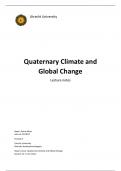Class notes
Lecture Notes 'Quaternary Climate and Global Change' UU
- Course
- Institution
Notes from all courses in the 'Quaternary Climate and Global Change' course, including images of powerpoints, etc. from the bachelor's degree in Earth Sciences at UU.
[Show more]



